C++ 中用cin方式获取输入的几种常用方式
一、前言
在C++程序的编写过程中,可能会经常用到cin方式用来捕获输入设备的输入信息。细分的话,主要的方式有:cin>>、cin.get、cin.getline。在借助键盘等字符输入设备进行输入的时候,如果键入Enter(\r)才会把目标字符输入到缓存区,,键入的'\r'会被转换成一个'\n',这个换行符同样也会被输入到缓存区,当做一个键入字符来处理。
参考资料:https://blog.csdn.net/k346k346/article/details/48213811
二、测试环境
Win10 + Visual Studio 2017 + Debug (x86)
三、cin>>方式
可以从输入设备连续提取输入信息,其中,可以作为分格符使用的有Tab、空格(Space),换行符是用作结束符使用。
1 #include "pch.h" 2 #include <iostream> 3 #include <string> 4 #include <vector> 5 6 using namespace std; 7 8 int main(void) { 9 string str; 10 while (cin >> str) { 11 cout << str << '\n' << endl; 12 } 13 return 0; 14 }
测试结果如下【输入:orange[Space]juice[Tab]orange[Enter]】。
1 orange juice orange 2 orange 3 4 juice 5 6 orange
这种方式下的str,经过调试发现,并不会在最后出现截止符‘\0’。
(1)、cin>> 等价于cin.operator>>(),调用成员函数operator>>()进行数据的读取;
(2)、当cin>>方式从缓存区读取数据时,会自动忽略作为第一个字符存在的Tab、空格(Space)、换行,继续读取下一个字符,若缓存区为空,则继续等待。但是如果读取成功,字符后面的分隔符是残留在缓冲区的,cin>>不做处理。
个人觉得体验不好的一点:结束输入的时候,需要【Ctrl + Z】+ 【Enter】,连续两次的输入才能达到目的。【经过查询,有的网友认为是编译器的原因,这里还没有进行进一步的确定】
四、cin.get方式
cin..get方式用来读取一个字符,包括空格【Space】。
主要的实现方式有两种:cin.get、cin.get(para)。
1 #include "pch.h" 2 #include <iostream> 3 #include <string> 4 #include <vector> 5 6 using namespace std; 7 8 int main(void) { 9 char a, b; 10 a = cin.get(); 11 cin.get(b); 12 cout << a << b << endl; 13 system("pause"); 14 return 0; 15 }
测试结果如下【输入:cv[Enter]】。
cv
cv
请按任意键继续. . .
需要注意的是,cin.get()从输入缓存区读取单个字符时,并不会忽略分割符;cin.get()的返回值是int类型,成功读取的时候则返回字符的ASCII码值,遇到文件结束符时则返回EOF(-1)【Windows下的结束符:Ctrl + z;Linux下的结束符:Ctrl + d】;cin.get(para)在读取成功的时候返回的是cin对象,对此,我们可以进行链式操作,比如cin.get(a).get(b)。
cin.get()方式用来读取一行的流数据,有两种方式:
istream& get (char* s, streamsize n)【默认以换行符结束】;
istream& get (char* s, size_t n, streamsize delin)【可指定结束符,n表示目标空间的大小】。
1 #include "pch.h" 2 #include <iostream> 3 #include <string> 4 #include <vector> 5 6 using namespace std; 7 8 int main(void) {
9 char a; 10 char array[10] = { NULL }; 11 12 cin.get(array, 10); 13 cin.get(a); 14 cout << array << ' '<< (int)a << endl; 15 16 system("pause"); 17 return 0; 18 }
结果1【输入:0123456789[Space][Enter]】。
1 0123456789 2 012345678 57
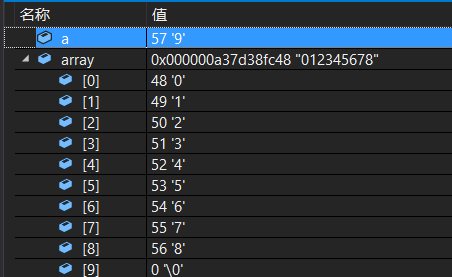
结果2【输入:012345678[Space][Enter]】
1 012345678 2 012345678 32
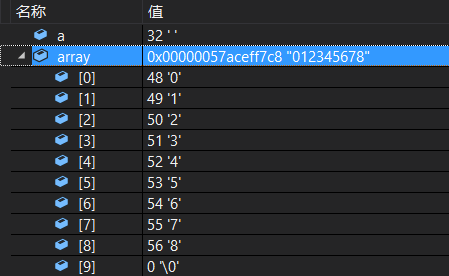
结果3【输入:01234567[Space][Enter]】
1 01234567 2 01234567 10

cin.get(array, 10)在进行数据读取时,遇到换行符结束,但是不对换行符进行处理。如果换行符之前数据个数超过9【包括[Space]】,则array读取的是前9个。对于换行符,cin.get(a)会对其进行相应的处理。
五、cin.getline方式
cin.getline():从标准输入设备读取一串字符串,并以指定的结束符结束。
相关的函数原型有:
istream& getline(char* s, streamsize count)【默认以换行符结束】;
istream& getline(char* s, streamsize count, char delim)【delim用以指定结束符】。
1 #include "pch.h" 2 #include <iostream> 3 #include <string> 4 #include <vector> 5 6 using namespace std; 7 8 int main(void) { 9 char a; 10 char array[10] = { NULL }; 11 12 cin.getline(array, 10); 13 cout << array << endl; 14 15 system("pause"); 16 return 0; 17 }
测试结果1【输入:12345678978[Space][Enter]】。
1 12345678978 2 123456789
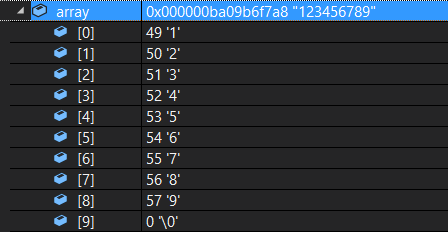
测试结果2【输入:12345678[Space][Enter]】。
1 12345678 2 12345678
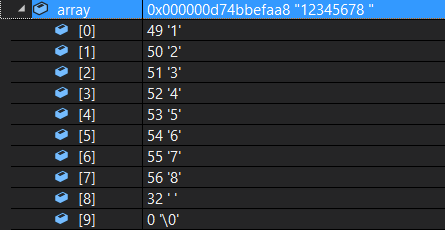
cin.getline()方式不会将结束符或者是换行符输入到缓存区中。
五、其他的一些方式
1、getline
getline:定义在namespace的全局函数,声明放在了<string>文件中。、
getline利用cin可以从标准输入设备键盘读取一行,当遇到如下三种情况会结束读操作:
(1)、文件结束;
(2)、行分割符的出现;
(3)、输入达到最大限度。
函数原型有两种:
istream& getline ( istream& is, string& str);【默认以换行符\n分隔行】
istream& getline ( istream& is, string& str, char delim)。
1 #include "pch.h" 2 #include <iostream> 3 #include <string> 4 #include <vector> 5 6 using namespace std; 7 8 int main(void) { 9 string str; 10 11 getline(cin, str); 12 13 system("pause"); 14 return 0; 15 }
测试结果【输入:Hello World![Enter]】

cin.getline()的输出是char*,getline()的输出是string。cin.getline()属于istream流,getline()属于string流,有一定的区别。
2、gets
gets属于C语言的库函数,在<stdio.h>中申明。
从标准输入设备读取字符串,可以无限读取,不会判断上限,以回车结束或者EOF时停止读取。在实际的应用过程中,应该确保缓存空间足够大,以防发生溢出。
函数原型:char *gets( char *buffer )。
1 #include "pch.h" 2 #include <iostream> 3 #include <string> 4 #include <vector> 5 6 using namespace std; 7 int main(void) { 8 char array[20] = { NULL }; 9 10 gets_s(array); 11 12 cout << array << endl; 13 14 system("pause"); 15 return 0; 16 }
测试结果【输入:Hello World![Enter]】
1 Hello World! 2 Hello World!
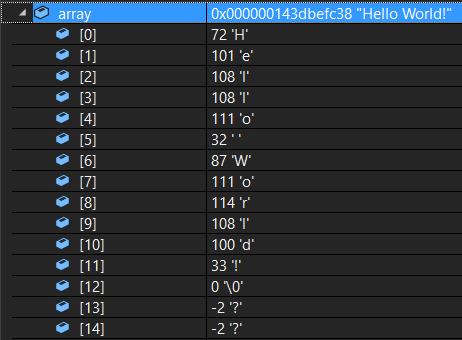
六、总结
还有一些细节了解的并不是很清楚,需要进一步的学习和实践。




